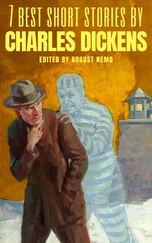Charles Dickens - Pearl-Fishing; Choice Stories from Dickens' Household Words; First Series
Здесь есть возможность читать онлайн «Charles Dickens - Pearl-Fishing; Choice Stories from Dickens' Household Words; First Series» — ознакомительный отрывок электронной книги совершенно бесплатно, а после прочтения отрывка купить полную версию. В некоторых случаях можно слушать аудио, скачать через торрент в формате fb2 и присутствует краткое содержание. ISBN: , Издательство: Иностранный паблик, Жанр: foreign_prose, на английском языке. Описание произведения, (предисловие) а так же отзывы посетителей доступны на портале библиотеки ЛибКат.
- Название:Pearl-Fishing; Choice Stories from Dickens' Household Words; First Series
- Автор:
- Издательство:Иностранный паблик
- Жанр:
- Год:неизвестен
- ISBN:http://www.gutenberg.org/ebooks/49927
- Рейтинг книги:5 / 5. Голосов: 1
-
Избранное:Добавить в избранное
- Отзывы:
-
Ваша оценка:
- 100
- 1
- 2
- 3
- 4
- 5
Pearl-Fishing; Choice Stories from Dickens' Household Words; First Series: краткое содержание, описание и аннотация
Предлагаем к чтению аннотацию, описание, краткое содержание или предисловие (зависит от того, что написал сам автор книги «Pearl-Fishing; Choice Stories from Dickens' Household Words; First Series»). Если вы не нашли необходимую информацию о книге — напишите в комментариях, мы постараемся отыскать её.
Pearl-Fishing; Choice Stories from Dickens' Household Words; First Series — читать онлайн ознакомительный отрывок
Ниже представлен текст книги, разбитый по страницам. Система сохранения места последней прочитанной страницы, позволяет с удобством читать онлайн бесплатно книгу «Pearl-Fishing; Choice Stories from Dickens' Household Words; First Series», без необходимости каждый раз заново искать на чём Вы остановились. Поставьте закладку, и сможете в любой момент перейти на страницу, на которой закончили чтение.
Интервал:
Закладка:
“Did I know him,” said Charles, turning suddenly towards her, for, under pretence that the light annoyed him, he always lay with his face to the wall. “Why do you ask, mother?”
“Because he’s dead! He had a fever, and – ”
“Herbert dead!” cried Charles, suddenly sitting up in the bed.
“Yes, he had a fever, and it is supposed he was delirious, for he blew out his brains; there is a report that he had been playing high, and lost a great deal of money. What’s the matter, dear? Oh, Charles, I shouldn’t have told you! I was not aware that you knew him!”
“Fetch my father here, and, mother, you come back with him!” said Charles, speaking with a strange sternness of tone, and wildly motioning her out of the room.
When the parents came, he bade them sit down beside him; and then, with a degree of remorse and anguish that no words could portray, he told them all; whilst they, with blanched cheeks and fainting hearts, listened to the dire confession.
“And here I am,” he exclaimed, as he ended, “a cowardly scoundrel that has not dared to die! Oh, Herbert! happy, happy, Herbert! Would I were with you!”
At that moment the door opened, and a beautiful, bright, smiling, joyous face peeped in. It was Emily Lovell, the beloved daughter, the adored sister, arrived from London in compliance with a letter received a few days previously from Herbert, wherein he had told her that by the time she received it, he would be a captain. She had come to introduce him to her parents as her affianced husband. She feared no refusal; well she knew how rejoiced they would be to see her the wife of so kind and honorable a man. But they were ignorant of all this, and in the fulness of their agony, the cup of woe ran over, and she drank of the draught! They told her all before she had been five minutes in the room. How else could they account for their tears, their confusion, their bewilderment, their despair!
Before Herbert’s funeral took place, Emily Lovell was lying betwixt life and death in a brain fever. Under the influence of a feeling easily to be comprehended, thirsting for a self-imposed torture, that by its very poignancy should relieve the dead weight of wretchedness that lay upon his breast, Charles crept from his bed, and slipping on a loose coat that hung in his room, he stole across the garden to the tower, whence, through the arrow-slit, he witnessed the burial of his sister’s lover, whom he had hastened to the grave.
Here terminates our sad story. We left T – on the following morning, and it was two or three years before any further intelligence of the Lovell family reached us. All we then heard was, that Charles had gone, a self-condemned exile, to Australia; and that Emily had insisted on accompanying him thither.
II.
The Serf of Pobereze
THE materials for the following tale were furnished to the writer while travelling last year near the spot on which the events it narrates took place. It is intended to convey a notion of some of the phases of Polish, or rather Russian serfdom (for, as truly explained by one of the characters in a succeeding page, it is Russian), and of the catastrophes it has occasioned, not only in Catherine’s time, but occasionally at the present. The Polish nobles – themselves in slavery – earnestly desire the emancipation of their serfs, which Russian domination forbids.
The small town of Pobereze stands at the foot of a stony mountain, watered by numerous springs in the district of Podolia, in Poland. It consists of a mass of miserable cabins, with a Catholic chapel and two Greek churches in the midst, the latter distinguished by their gilded towers. On one side of the market-place stands the only inn, and on the opposite side are several shops, from whose doors and windows look out several dirtily-dressed Jews. At a little distance, on a hill covered with vines and fruit-trees, stands the Palace, which does not, perhaps, exactly merit such an appellation, but who would dare to call otherwise the dwelling of the lord of the domain?
On the morning when our tale opens, there had issued from this palace the common enough command to the superintendent of the estate, to furnish the master with a couple of strong boys, for service in the stables, and a young girl, to be employed in the wardrobe. Accordingly, a number of the best-looking young peasants of Olgogrod assembled in the broad avenue leading to the palace. Some were accompanied by their sorrowful and weeping parents, in all of whose hearts, however, rose the faint and whispered hope, “Perhaps it will not be my child they will choose!”
Being brought into the court-yard of the palace, the Count Roszynski, with the several members of his family, had come out to pass in review his growing subjects. He was a small and insignificant-looking man, about fifty years of age, with deep-set eyes and overhanging brows. His wife, who was nearly of the same age, was immensely stout, with a vulgar face and a loud disagreeable voice. She made herself ridiculous in endeavoring to imitate the manners and bearing of the aristocracy, into whose sphere she and her husband were determined to force themselves, in spite of the humbleness of their origin. The father of the “Right Honorable” Count Roszynski was a valet, who, having been a great favorite with his master, amassed sufficient money to enable his son, who inherited it, to purchase the extensive estate of Olgogrod, and with it the sole proprietorship of 1,600 human beings. Over them he had complete control; and, when maddened by oppression, if they dared resent, woe unto them! They could be thrust into a noisome dungeon, and chained by one hand from the light of day for years, until their very existence was forgotten by all except the jailer who brought daily their pitcher of water and morsel of dry bread.
Some of the old peasants say that Sava, father of the young peasant girl, who stands by the side of an old woman, at the head of her companions in the court-yard, is immured in one of these subterranean jails. Sava was always about the Count, who, it was said, had brought him from some distant land, with his little motherless child. Sava placed her under the care of an old man and woman, who had the charge of the bees in a forest near the palace, where he came occasionally to visit her. But once, six long months passed, and he did not come! In vain Anielka wept, in vain she cried, “Where is my father?” – No father appeared. At last it was said that Sava had been sent to a long distance with a large sum of money, and had been killed by robbers. In the ninth year of one’s life the most poignant grief is quickly effaced, and after six months Anielka ceased to grieve. The old people were very kind to her, and loved her as if she were their own child. That Anielka might be chosen to serve in the palace never entered their head, for who would be so barbarous as to take the child away from an old woman of seventy and her aged husband?
To-day was the first time in her life that she had been so far from home. She looked curiously on all she saw, – particularly on a young lady about her own age, beautifully dressed, and a youth of eighteen, who had apparently just returned from a ride on horseback, as he held a whip in his hand, whilst walking up and down and examining the boys who were placed in a row before him. He chose two amongst them, and the boys were led away to the stables.
“And I choose this young girl,” said Constantia Roszynski, indicating Anielka; “she is the prettiest of them all. I do not like ugly faces about me.”
When Constantia returned to the drawing-room, she gave orders for Anielka to be taken to her apartments, and placed under the tutelage of Mademoiselle Dufour, a French maid, recently arrived from the first milliner’s shop in Odessa. Poor girl! when they separated her from her adopted mother, and began leading her towards the palace, she rushed, with a shriek of agony, from them, and grasped her old protectress tightly in her arms! They were torn violently asunder, and the Count Roszynski quietly asked, “Is it her daughter, or her grand-daughter?”
Читать дальшеИнтервал:
Закладка:
Похожие книги на «Pearl-Fishing; Choice Stories from Dickens' Household Words; First Series»
Представляем Вашему вниманию похожие книги на «Pearl-Fishing; Choice Stories from Dickens' Household Words; First Series» списком для выбора. Мы отобрали схожую по названию и смыслу литературу в надежде предоставить читателям больше вариантов отыскать новые, интересные, ещё непрочитанные произведения.
Обсуждение, отзывы о книге «Pearl-Fishing; Choice Stories from Dickens' Household Words; First Series» и просто собственные мнения читателей. Оставьте ваши комментарии, напишите, что Вы думаете о произведении, его смысле или главных героях. Укажите что конкретно понравилось, а что нет, и почему Вы так считаете.












